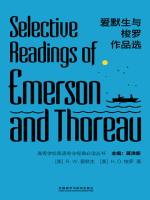A Profound Explora
Xavier
A Profound Exploration of Individualism and Transcendence: Reflections
on Emerson's Works Ralph Waldo Emerson, a towering figure in American
literature and philosophy, has left an indelible mark on the world
through his insightful essays, lectures, and poems. Reading through a
collection of Emerson's works is like embarking on a transformative
intellectual journey, one that challenges conventional wisdom,
celebrates the power of the individual, and invites readers to embrace a
deeper connection with nature, self, and the divine. At the core of
Emerson's philosophy is the concept of individualism. He passionately
advocates for the liberation of the self from the shackles of societal
conformity and tradition. In essays such as “Self-Reliance,” Emerson
boldly proclaims, “Trust thyself: every heart vibrates to that iron
string.” This clarion call urges individuals to have unwavering faith in
their own instincts, ideas, and capabilities. He argues that true wisdom
and authenticity stem from an internal source rather than external
authorities. By encouraging readers to break free from the fear of being
different or deviating from the norm, Emerson empowers them to explore
their unique paths, pursue their passions, and contribute their distinct
voices to the world. In a society often characterized by peer pressure
and the pursuit of uniformity, Emerson’s emphasis on individualism
serves as a powerful reminder of the importance of staying true to
oneself. Emerson’s profound reverence for nature is another central
theme that permeates his works. He views nature not merely as a backdrop
but as a living, breathing entity that holds the key to spiritual
enlightenment. In “Nature,” he describes nature as “a discipline of the
intellect” and “a manifestation of the divine.” Through his vivid and
lyrical descriptions, Emerson invites readers to see the world with
fresh eyes, to find beauty and meaning in the simplest of natural
phenomena, from a blooming flower to a starlit sky. He posits that by
immersing ourselves in nature, we can transcend the limitations of our
everyday existence, gain a broader perspective on life, and forge a
deeper connection with the universal spirit. This perspective not only
fosters a sense of awe and wonder but also instills in us a
responsibility to protect and cherish the natural world, as it is
through nature that we can achieve a more profound understanding of
ourselves and our place in the cosmos. The idea of transcendentalism,
which Emerson is a central figure of, is intricately woven into his
writings. Transcendentalism posits that there is a higher truth or
spiritual reality that exists beyond the physical world and can be
accessed through intuition and contemplation. Emerson believes that
every individual has the potential to tap into this transcendent realm
and gain insights that go beyond the reach of ordinary perception. His
works are filled with references to the “Over-Soul,” a collective
spiritual essence that unites all beings. By connecting with the
Over-Soul, individuals can overcome the barriers of individuality and
experience a sense of oneness with the universe. This philosophical
concept not only offers a source of comfort and inspiration but also
challenges readers to look beyond the surface-level aspects of life and
seek a more profound, spiritual understanding of existence. Moreover,
Emerson’s writings are replete with practical wisdom and timeless advice
on how to live a meaningful life. He emphasizes the importance of
cultivating virtues such as courage, integrity, and perseverance. He
encourages readers to embrace change, learn from failure, and constantly
strive for self-improvement. His words serve as a guidepost for
navigating the complexities of life, reminding us that true fulfillment
comes not from external achievements or possessions but from the
development of our inner selves and our relationships with others and
the world around us. In conclusion, reading Emerson’s works is a
deeply enriching experience that enriches the mind, stirs the soul, and
broadens one’s perspective. His ideas on individualism, nature,
transcendentalism, and the pursuit of a meaningful life continue to
resonate powerfully in the modern era. In a world often fraught with
uncertainty and chaos, Emerson’s writings offer a beacon of hope, a
source of inspiration, and a call to action for individuals to embrace
their true selves, connect with the natural world, and strive for a
higher level of consciousness and understanding. His literary and
philosophical legacy serves as a testament to the enduring power of
ideas and their ability to shape and transform the human experience.



 京公网安备 11010802032529号
京公网安备 11010802032529号